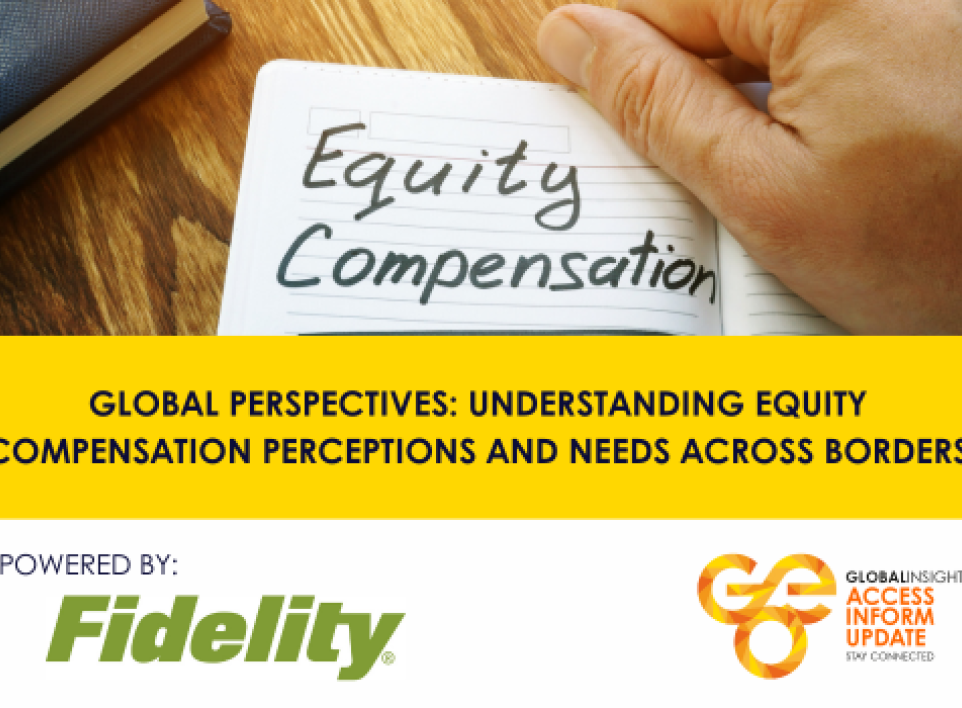Enhancing your global equity compensation strategy requires a deep dive into how participants across the world perceive and engage with these programs.
During a webinar held on 19 September 2024, Emily Cervino and Sarah Francis from Fidelity explored global perspectives, delving into their research that unveiled unique characteristics of equity compensation participants from Canada, China, Germany, India, the UK, and the US.
The session also shed light on how factors such as age and gender influence perceptions, offering invaluable insights into satisfaction, confidence, and educational needs.
In today’s competitive landscape, understanding these nuances is crucial for tailoring strategies that resonate globally, ensuring your equity compensation plans are both effective and impactful.
The rising importance of equity compensation
Equity compensation is a cornerstone of employee satisfaction and retention worldwide. Research indicates that 6 out of 10 companies are expanding eligibility for equity awards, with more than half increasing the value of these awards. As companies expand globally, the need to tailor these plans to meet regional differences becomes increasingly important.
Multinational organizations, some operating across more than 50 countries, must adjust for varying local requirements and cultural contexts to ensure their equity plans succeed.
Regional perceptions and behaviors
The webinar underscored how employees in different countries engage with equity compensation in distinct ways:
- Canada: Canadian participants are highly engaged, with 50% having sought professional financial advice, leading to higher confidence. About 68% plan to use stock plan assets for long-term goals like retirement.
- China and India: In these emerging markets, many participants are first-time stock owners, emphasizing the need for education on financial literacy and the long-term benefits of stock ownership.
- Germany: German participants have strong financial literacy but lower confidence in decision-making due to concerns over stock price volatility, underscoring the need for more structured educational resources.
- UK: Nearly half of UK participants are first-time stock owners with lower confidence, though satisfaction with Employee Stock Purchase Plans (ESPPs) is high due to payroll deductions and discounts. More education could address the knowledge gap.
- United States: In the US, a gap exists between intentions and actions—many plan to use equity compensation for retirement, but few follow through. Clear communication about the long-term benefits can help close this gap.
- India: Indian employees are highly engaged, often seeing equity programs as a primary source of retirement savings. Despite regulatory challenges, participation remains strong, reflecting broad enthusiasm for equity plans.
Actionable insights for a global strategy
Global equity compensation strategies cannot follow a one-size-fits-all approach. To ensure success, companies must adapt their programs to suit the specific needs of different regions. Key recommendations from the webinar include:
- Localized education: Offering region-specific resources and financial literacy tools empowers employees to make more informed decisions, especially in regions where professional advice is less accessible.
- Cultural relevance: Aligning equity strategies with local cultural values ensures better engagement. While long-term financial planning might resonate with Canadian employees, other regions may have more immediate financial concerns.
- Ongoing assessment: Continuously evaluating the performance of equity plans by region helps identify areas for improvement and adaptation, ensuring that the plans meet the evolving needs of the workforce.
In conclusion, tailoring equity compensation strategies to the specific needs of different regions is essential for boosting employee engagement and satisfaction. By providing localized education, understanding cultural differences, and regularly assessing plan effectiveness, companies can create compelling global equity programs that truly resonate with their diverse workforces.
This article is sponsored by Fidelity, a leader in helping organizations maximize the value of their global equity compensation strategies.
Contact Emily or Sarah directly for more information.
View a recording of the webinar on GEOlearn HERE.
1169683.1.0
GEO and Fidelity are not affiliated.
Fidelity data as of March 2023.




